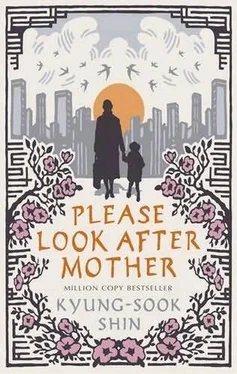Kyung-sook Shin - Please Look After Mom
Здесь есть возможность читать онлайн «Kyung-sook Shin - Please Look After Mom» весь текст электронной книги совершенно бесплатно (целиком полную версию без сокращений). В некоторых случаях можно слушать аудио, скачать через торрент в формате fb2 и присутствует краткое содержание. Жанр: Современная проза, на английском языке. Описание произведения, (предисловие) а так же отзывы посетителей доступны на портале библиотеки ЛибКат.
- Название:Please Look After Mom
- Автор:
- Жанр:
- Год:неизвестен
- ISBN:нет данных
- Рейтинг книги:4.5 / 5. Голосов: 2
-
Избранное:Добавить в избранное
- Отзывы:
-
Ваша оценка:
- 100
- 1
- 2
- 3
- 4
- 5
Please Look After Mom: краткое содержание, описание и аннотация
Предлагаем к чтению аннотацию, описание, краткое содержание или предисловие (зависит от того, что написал сам автор книги «Please Look After Mom»). Если вы не нашли необходимую информацию о книге — напишите в комментариях, мы постараемся отыскать её.
Told through the piercing voices and urgent perspectives of a daughter, son, husband, and mother, Please Look After Mom is at once an authentic picture of contemporary life in Korea and a universal story of family love.
You will never think of your mother the same way again after you read this book.
Please Look After Mom — читать онлайн бесплатно полную книгу (весь текст) целиком
Ниже представлен текст книги, разбитый по страницам. Система сохранения места последней прочитанной страницы, позволяет с удобством читать онлайн бесплатно книгу «Please Look After Mom», без необходимости каждый раз заново искать на чём Вы остановились. Поставьте закладку, и сможете в любой момент перейти на страницу, на которой закончили чтение.
Интервал:
Закладка:
You realize that you’ve never even handed your wife a glass of warm water when she couldn’t keep food down for days, her stomach upset.
It all started when you were roaming the country, immersed in playing traditional drums. Two weeks later, you came home, and your wife had given birth to your daughter. Your sister, who’d delivered the baby, said it was an easy birth, but your wife had diarrhea. It was so severe that she didn’t have any color in her face, and her cheekbones were protruding sharply even though she had just had a baby. Her condition didn’t improve. It seemed to you that she wouldn’t get better unless you did something. You gave your sister some money for some Chinese medicine.
Your sobs grow louder as you sit on the porch of the empty house.
Now you see that this was the only time you’ve ever paid for medicine for your wife. Your sister bought three packets of Chinese medicine and boiled it and gave it to your wife. Afterward, when your wife had stomach problems, she would say, “If I could have had two more packets of Chinese medicine back then, I would have been cured.”
Your relatives liked your wife. All you said to them was hello when they arrived and goodbye when they left, but your many relatives came because of your wife. People said that your wife’s food brimmed with love. Even if all she did was to go to the garden and bring in some greens for bean-paste soup and a Chinese cabbage for a simple salted-cabbage dish, people dug in heartily, praising the bean-paste soup and the salted cabbage. Your nephews and nieces would come to stay with you during school vacations and comment that they had gained so much weight that they couldn’t button their school uniforms. Everyone said that the rice your wife made fattened people. When you and your neighbors planted rice in your paddies and your wife brought them a lunch of rice and scabbard fish stewed with new potatoes, people would stop to stuff the food in their mouths. Even passersby would pause to eat. Villagers vied to help in your fields. They said that when they ate your wife’s lunch they got so full that they could do double the amount of work before getting hungry again. If a peddler selling melon or clothing happened to peek inside the gate during the family’s lunch, your wife was the kind of person who would welcome him in and give him a meal. Your wife, who happily ate with strangers, got along with everyone, except with your sister.
When your wife was suffering from stomach problems, she would complain as if that offense had occurred the day before. “It would have been good if I’d taken two more packets of Chinese medicine back then… Even you said that I needed two more portions because I’d just had a baby and had to get well, but your sister said, with that mean face, ‘Why do you need more medicine? This is enough.’ And she didn’t get me any more. If I’d taken two more portions I wouldn’t have to go through this.” But you had no recollection of it. And even though she repeated the story, you never got medicine for your wife when she had diarrhea.
“I should have taken more medicine. Now nothing works.” When your wife had diarrhea, she stopped eating. You didn’t understand how someone could stop eating for days. You ignored it when you were younger; not until you were older did you ever ask if she should eat something. Then your wife would say, with a miserable expression, “Animals don’t eat when they’re sick. Cows, pigs… when they’re sick they stop eating. Even chickens. The dog stops eating when it’s sick. When it’s sick, it doesn’t look at food, even if I give it something good, and it digs a hole in front of its house and lies down in there. A few days later, it’ll get up. And that’s when it will eat. People are the same way. My stomach is not feeling well, and even if the food is great, it’s like poison when it gets inside me.”
When the diarrhea didn’t stop, she would grate dried persimmons and eat a spoonful. She would refuse to go to the hospital. “How can dried persimmons be medicine? Go to the hospital, and see the doctor, and get medicine from the pharmacy,” you urged her, but she didn’t listen. Finally, if you insisted, she would snap, “Didn’t I say I wasn’t going to the hospital?” and wouldn’t let you bring it up again.
One year, you left home in the summer and returned in the winter, and when you got back you found a lump in your wife’s left breast. You remarked that it wasn’t normal, but your wife wasn’t moved. Only when her nipple caved in and was filled with discharge did you take her to the hospital in town, her work towel still wrapped around her head. They couldn’t tell you what it was right away, but examined her and said it would take ten days to get the results back. Your wife sighed. What happened during those ten days? What were you doing that was so important that you didn’t go back to hear the results? Why did you put off going back to find out what was wrong? Finally, when her nipple became abscessed, you took your wife and went back to the hospital. The doctor said your wife had breast cancer.
“Cancer?” Your wife said that it was impossible: she didn’t have time to lie in bed sick, she had too much to do. The doctor explained that your wife didn’t fit the profile for a high risk of breast cancer. She hadn’t had children late in life, she breastfed all five children, she didn’t get her period when she was very young, since she got it the year she married you, and she didn’t enjoy meat-in fact, she couldn’t afford to. But cancer cells were growing in your wife’s left breast. If you had gone back to hear the results right away, they might not have had to cut off her breast. Soon after the surgery, her chest still wrapped with bandages, your wife planted potatoes in the field. Burying the sprouted potatoes in the field-which now belonged to someone else, because you’d sold it to pay for the surgery-she declared, “I will never go to the hospital again!” Not only did she refuse to go to the hospital, but she also wouldn’t let you come near her.
Around the time you were to go to Seoul for your birthday, your wife was suffering from stomach problems. You worried whether she could go to Seoul if she was so weak, but she asked you to go to town to buy bananas, having heard about some remedy or other. Before you went to Seoul, she ate a mixture of two dried persimmons and half a banana for three meals straight. Even though she’d never stayed in bed for more than a week after giving birth, she was laid up in bed for ten days with the occasional stomach problem. And your wife started to forget the dates of ancestral rites. When she made kimchi, she would stop and sit staring into space. If you asked her what was wrong, she would say, “I don’t know if I added garlic or not…” She would pick up a boiling pot of fermented-bean-paste stew with her bare hands and burn them. You just thought, She’s no longer young. You just thought, Even I spend my days without giving a thought to traditional drums, which I used to love so much. At this age, our bodies can’t be the same. You just thought, It’s about time things get broken. You assumed that ailments would be a constant companion at this age, and you thought that your wife was at that stage, too.

“Are you home?”
Your eyes fly open at your sister’s voice. For a second, you think you hear your wife’s voice, even though you know full well that only your sister would come to your house this early in the morning.
“I’m coming in,” she says, and opens your bedroom door. Your sister is holding a tray laden with a bowl of rice and side dishes, covered in a white cloth. She places the tray on the floor at one end of the room and looks at you. She lived here with you until forty years ago, when she built a house by the new road, and ever since, she would get up at dawn, smoke a cigarette, smooth her hair and secure it with a hairpin, and come to your house. Your sister would walk around your house in the dawn light, and then go home. Your wife always heard your sister’s footsteps, quietly circling the house, from the front yard to the side yard to the back yard. Your sister’s footsteps were the sound that woke your wife. Your wife would grunt and turn over and mutter, “She’s back,” and get up. Your sister just circled your house and went home-perhaps she was checking to make sure that your house had remained intact overnight. When she was young, she lost two older brothers at the same time, and parents within two days of each other; during the war, she almost lost you. After she married, her husband came to live in your village, instead of your sister’s going to live in her in-laws’ village. The wound of losing her young husband in a house fire soon after was rooted deeply in your sister, and had grown into a large tree, one that couldn’t be chopped down.
Читать дальшеИнтервал:
Закладка:
Похожие книги на «Please Look After Mom»
Представляем Вашему вниманию похожие книги на «Please Look After Mom» списком для выбора. Мы отобрали схожую по названию и смыслу литературу в надежде предоставить читателям больше вариантов отыскать новые, интересные, ещё непрочитанные произведения.
Обсуждение, отзывы о книге «Please Look After Mom» и просто собственные мнения читателей. Оставьте ваши комментарии, напишите, что Вы думаете о произведении, его смысле или главных героях. Укажите что конкретно понравилось, а что нет, и почему Вы так считаете.











